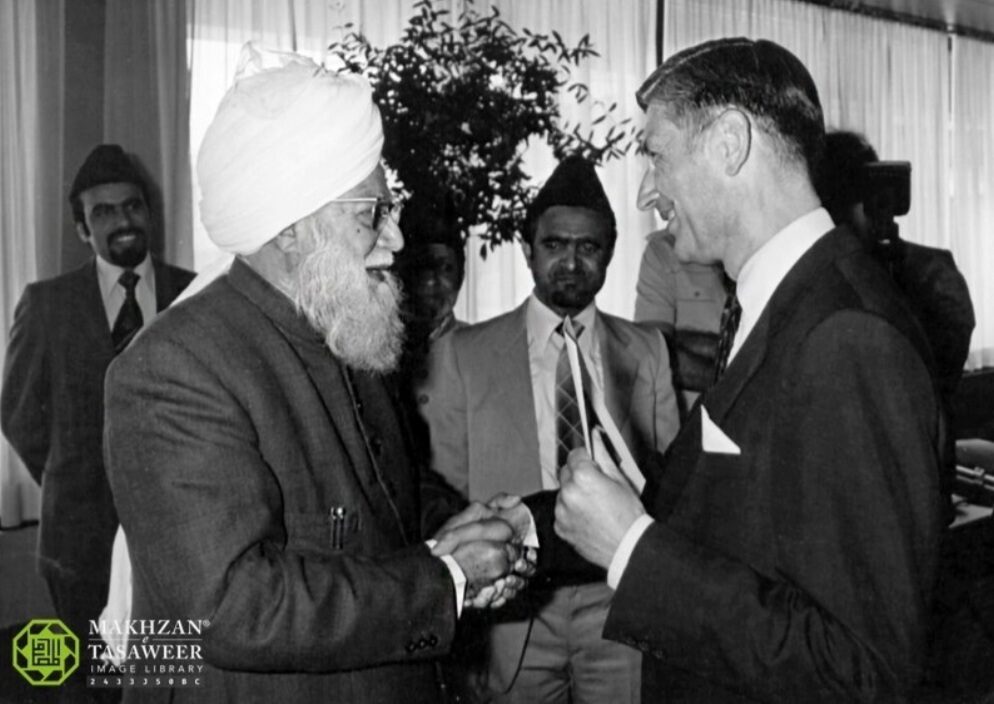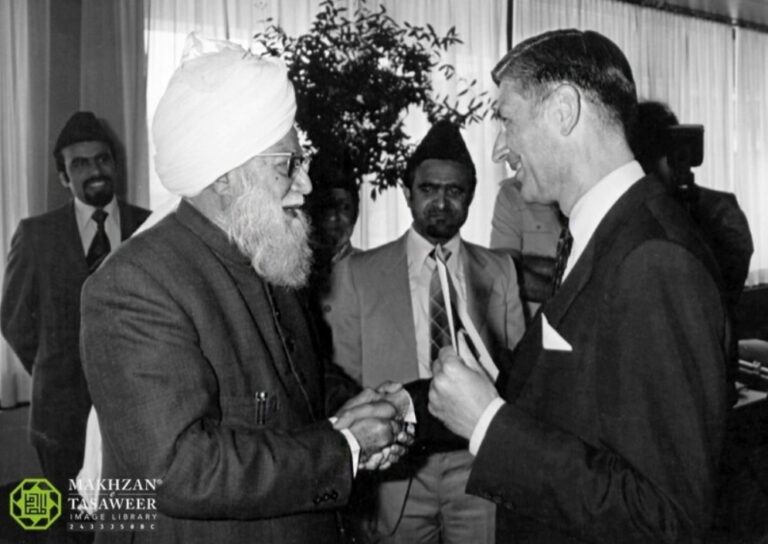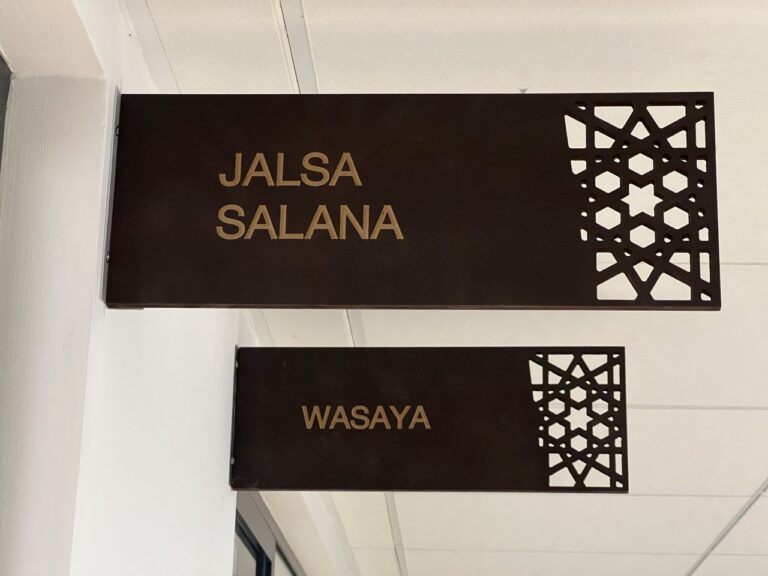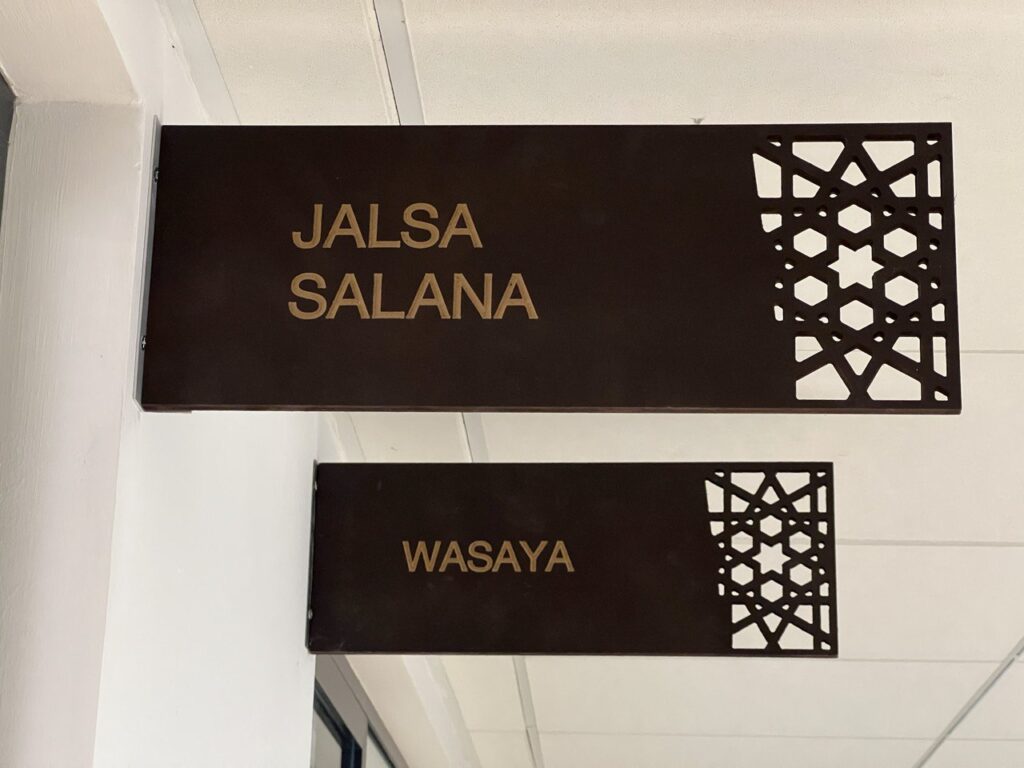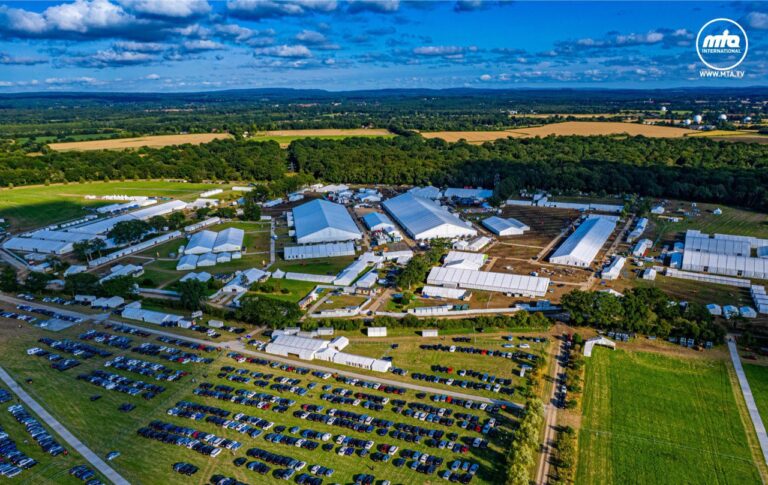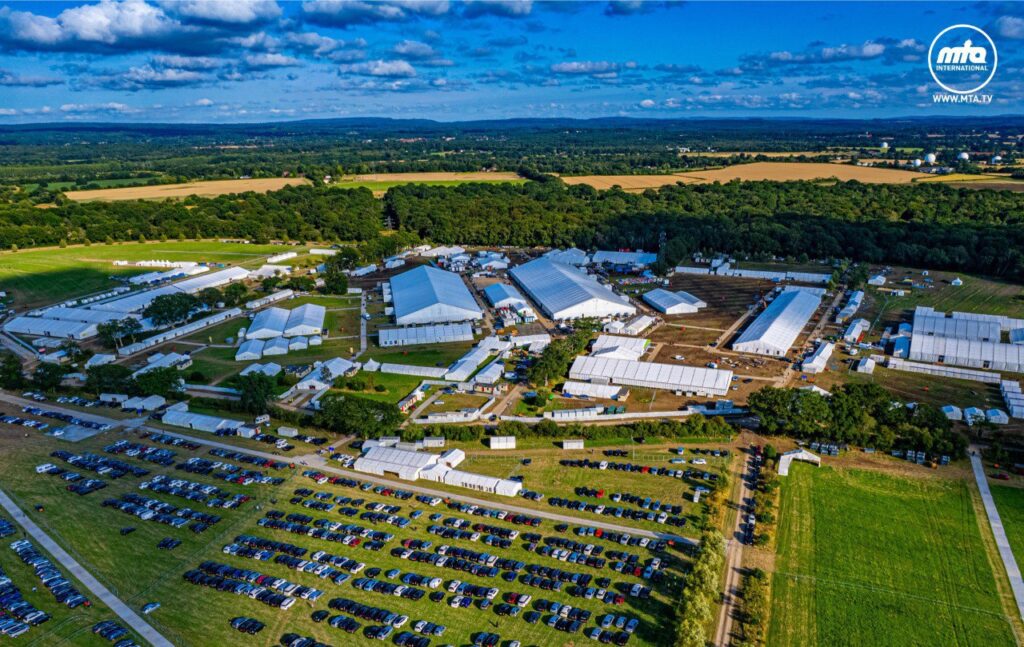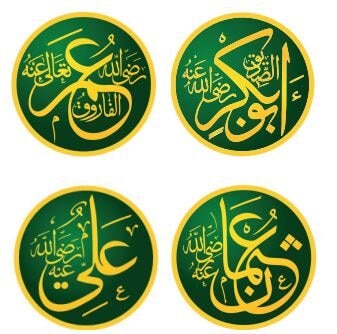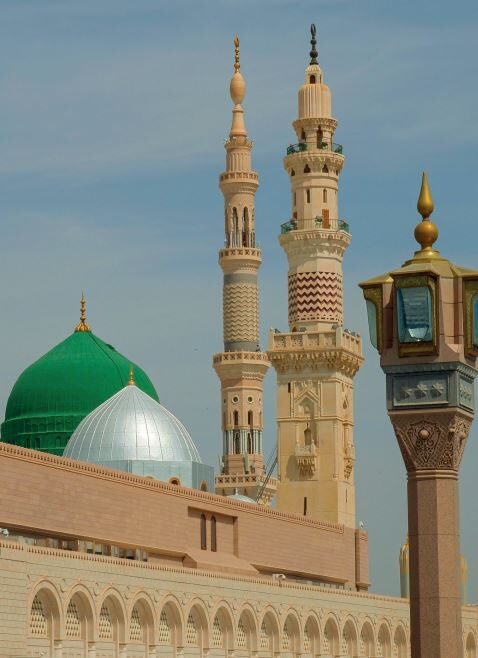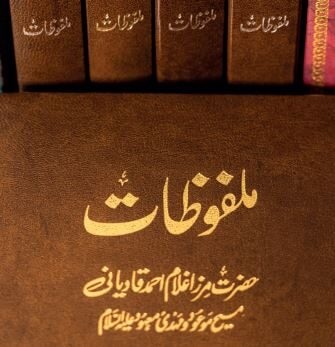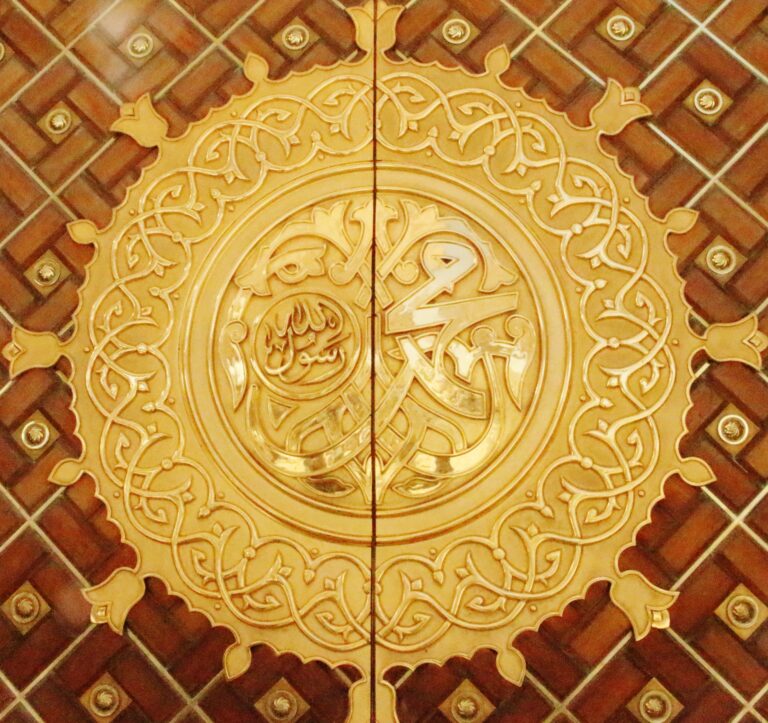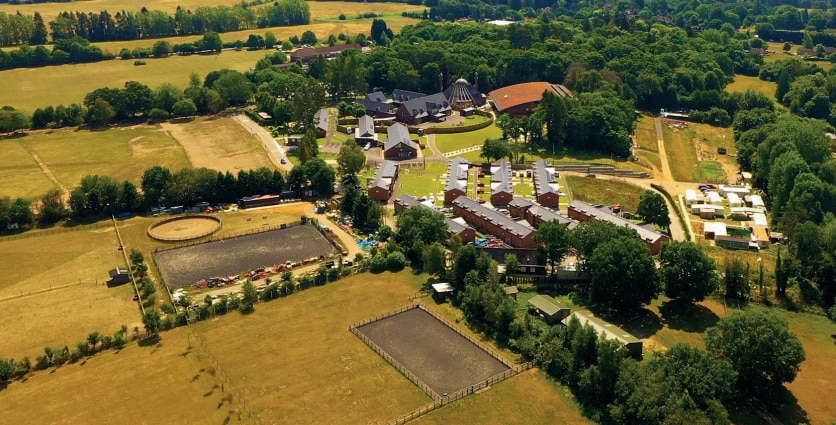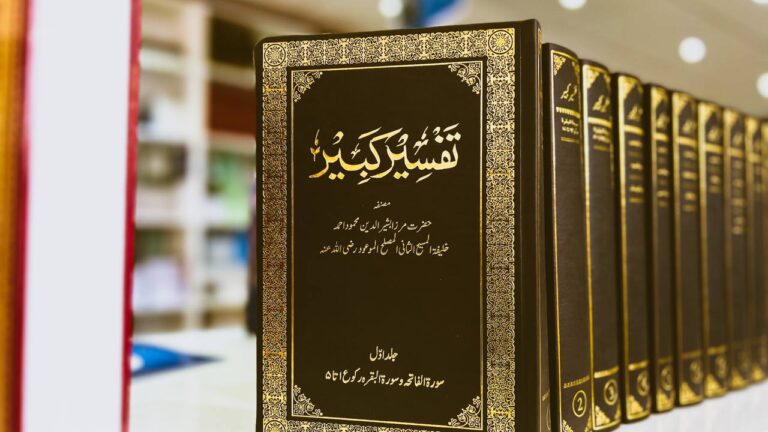Friday Sermon
14 July 2023
Muhammadsa: The great exemplar
After reciting the tashahud, ta‘awuz and Surah al-Fatihah, Hazrat Khalifatul Masih Vaa stated:
Accounts from the life of the Holy Prophetsa in relation to the Battle of Badr were being narrated. When the Battle of Badr concluded, Allah the Almighty brought the disbelievers to a bitter end. As has already been mentioned, 70 disbelievers were killed, including many prominent chiefs and leaders. With regards to the burial of these chiefs of the Quraish, it is written in Sahih al-Bukhari wherein Hazrat Abdullah bin Mas’udra relates: “The Holy Prophetsa was offering his prayers near the Ka’bah. (He was relating past events prior to this incident.) The Holy Prophetsa was offering his prayers near the Ka’bah when, being incited by some of the Quraish, one most wretched individual among them placed the entrails of an animal between the shoulders of the Holy Prophetsa while he was in prostration. The Holy Prophetsa remained in prostration and these individuals continued their mockery. Someone told Hazrat Fatimara, who was a young girl at the time, of this incident. She came running and the Holy Prophetsa remained in prostration until she removed it from his shoulders, (i.e., until Hazrat Fatimara removed the heavy entrails from his shoulders). Hazrat Fatimara started speaking ill of them. When the Holy Prophetsa completed his prayers, he supplicated: ‘O Allah! Seize the Quraish. O Allah! Seize the Quraish. O Allah! Seize the Quraish.’ Following this, he mentioned them by name: ‘O Allah! Seize ‘Amr bin Hisham, ‘Utbah bin Rabi’ah, Shaybah bin Rabi’ah, Walid bin ‘Utbah, Umayyah bin Khalaf, ‘Uqbah bin Abi Mu’ayt and ‘Umarah bin Walid.’” Hazrat Abdullahra further relates: “By Allah! On the day of Badr, I saw their corpses lying on the ground with my own eyes, (i.e., those individuals mentioned by the Holy Prophetsa). They were then dragged to a ditch in Badr and thrown therein. Following this, the Holy Prophetsa said: ‘Those in the ditch are cursed.’” (Sahih al-Bukhari, Kitab-ul-Salat, Hadith 520)
In books written on the life of the Holy Prophetsa it is written that the Holy Prophetsa said: “The corpses of the disbelievers should be removed from their places.” He had already marked out the places where they would be slain before the Battle of Badr commenced. Hazrat Umarra states: “The Holy Prophetsa had marked out places where the idolaters would be slain. Pointing to these places, he would say: ‘God willing, tomorrow this is where ‘Utbah bin Rabi’ah will be killed, this is where Shaybah bin Rabi’ah will be killed, this is where Umayyah bin Khalaf will be killed, this will be where Abu Jahl [Amr] bin Hisham will be killed; and this will be where such and such person will be killed […]’ The Holy Prophetsa would mark that place by putting his blessed hand on the ground at the exact spot. The next morning, in the Battle of Badr, their bodies lay in exactly the same place where the Holy Prophetsa had placed his blessed hand.” (As-Sirat-ul-Halabiyyah, Vol. 2, (Beirut, Lebanon: Dar al-Kutub al-‘Ilmiyyah, 2002), p. 245)
Hazrat Aishara relates that following the battle, the Holy Prophetsa instructed that all the corpses of the disbelievers should be put in a ditch. As such, they were all put in a ditch, except for Umayyah bin Khalaf. His body had become swollen within his armour and when they tried to lift him, parts of his flesh started falling out. Therefore, he was covered with sand and stones in that very place. (Sirat Ibn Hisham, Dar al-Kutub al-‘Ilmiyyah, 2001, p. 235)
When the Holy Prophetsa instructed the bodies of the disbelievers to be thrown into the ditch, ‘Utbah bin Rabi’a was taken and thrown into the ditch as well. The Holy Prophetsa saw discontentment in Hazrat Abu Hudhaifah’sra expression, as he was the son of Utbah, and had become a Muslim but, his father remained a disbeliever. The Holy Prophetsa said, “O Abu Huzaifah, perhaps you are discontent with regards to your father.” He replied, “No, O Messengersa of Allah, I have no doubt about him, nor about his killing. However, I knew my father to be a man of sound advice, forbearing, and honourable, so I hoped that these traits (i.e., these good qualities of his that he mentioned) would bring him towards Islam. When I witnessed his fate, I remembered his rejection, even though I had hoped he would accept Islam, and this is what has saddened me.” The Holy Prophetsa prayed in his favour (i.e., for Abu Huzaifahra) and said some words to console him. (Subul al-Huda wa al-Rashad fi Sirat Khair al-‘Ibad, Vol. 4, Beirut, Lebanon: Dar al-Kutub al-‘Ilmiyyah, 1993, pp. 56-57)
It is related by Hazrat Abu Talha Ansarira that on the day of the Battle of Badr, the Holy Prophetsa gave instructions in relation to 24 chieftains of the Quraish, and they were thus placed in one of the ditches of Badr. Whenever the Holy Prophetsa would defeat any opposition [in battle], he would remain in that area for three nights. On the third day of remaining in Badr, the Holy Prophetsa instructed that the saddle be tied to his camel. After the saddle was tied to the camel, the Holy Prophetsa set out along with his companions. The narrator states that they understood he was leaving for a certain purpose. The Holy Prophetsa reached the edge of the ditches where the disbelievers were buried. He addressed these deceased and their fathers by name, saying, “O son of so and so, O son of so and so, would it not please you now to have obeyed Allah and His Messengersa, for we have found true the promise made to us by God? Have you found true that which your lord had promised to you?” Abu Talha states that Hazrat Umarra asked, “O Messengersa of Allah, why do you speak to these lifeless corpses, (i.e., referring to those who had died)?” The Holy Prophetsa replied, “By the One in Whose hand is the life of Muhammadsa, they hear me better than you hear me now.” (Sahih al-Bukhari, Kitab al-Maghazi, Hadith 3976)
In Sirat Ibn Hisham, it is recorded in the following manner: “O people of the ditch! You proved to be most wretched relatives to your Prophet. You rejected me, while others testified to my truthfulness. You exiled me from my homeland, while others granted me protection. You waged war against me, while others supported me.”
He then said:
ھَلْ وَجَدْتُّمْ مَا وَعَدَکُمْ رَبُّکُمْ حَقًّا؟
“Did the promise made to you by your God prove to be true?” (Sirat Ibn Hisham, Dar al-Kutub al-‘Ilmiyyah, 2001, p. 435)
Hazrat Mirza Bashir Ahmadra has written about this incident in The Life & Character of the Seal of Prophets, in the following manner:
“Before returning, the Holy Prophetsa went to the pit where the chieftains of the Quraish had been buried, and calling the names of each one of them, he exclaimed:
ھَلْ وَجَدْتُّمْ مَا وَعَدَکُمُ اللّٰہُ حَقًّا فَاِنِّيْ وَجَدْتُّ مَاوَعَدَنِيَ اللّٰہُ حَقًّا
“‘Have you found true the promise made to you by God through me? Verily, I have found true the promise made to me by God.’
“Then, he added:
يَا اَھلَ الْقَلِيْبِ بِئْسَ عَشِيْرَةِ النَّبِّيِ کُنْتُمْ لِنَبِيِّکُمْ کَذَّبْتُمُوْنِيْ وَصَدَقَنِيَ النَّاسُ وَاَخْرَجْتُمُوْنِيْ وَآوَانِيَ النَّاسُ وَقَاتَلْتُمُوْنِيْ وَنَصَرَنِيَ النَّاسُ
“‘O ye people of the pit! You proved to be most wretched relatives of your Prophet. You rejected me, while others testified to my truthfulness. You exiled me from my homeland, while others granted me protection. You waged war against me, while others supported me.’
“Hazrat ‘Umarra submitted, ‘O Messengersa of Allah! They are dead, how can they hear you now.’ The Holy Prophetsa said, ‘They hear me better than you hear me now.’ In other words, they have reached a state where all truth becomes manifest and there remains no veil. These words of the Holy Prophetsa which have been written above, possessed mixed emotions of pain and agony. One may somewhat gauge the state of the Holy Prophet’ssa emotions which he was enduring at the time. It seems as if the past history of the opposition of the Quraish was before the eyes of the Holy Prophetsa at the time, and in a world of reminiscence, he would flip a page at a time, and his heart would become restless at the study of these pages. These words of the Holy Prophetsa are also categorical evidence that the responsibility of the initiation of this series of wars, lied completely with the disbelievers of Mecca. As is evident from these words of the Holy Prophetsa:
قَاتَلْتُمُوْنِيْ وَنَصَرَنِيَ النَّاسُ
“‘O my people! You waged war against me, while others supported me.’
“In the least, these words definitely demonstrate that in his own opinion, the Holy Prophetsa believed that these wars were initiated by the disbelievers, and he was compelled to take up the sword merely in his own defence.” (The Life & Character of the Seal of Prophets, Vol. 2 , pp. 155-156)
There is also mention of the miracles of the Holy Prophetsa during this battle. One of those is recorded in a book of sirah, in which Ibn Ishaq narrates:
“Ukashah bin Mihsan was fighting with his sword on the day of the Battle of Badr until it broke in his hand. He went to the Holy Prophetsa, and so he handed him a wooden stick, saying, ‘O Ukashah, fight the disbelievers with this.’ Ukashah took hold of it and waved it about, and the wooden stick turned into a sword that was fairly long, the metal of which was very strong, and its blade was of a white hue. He continued to fight on with this until Allah Almighty granted victory to the Muslims.”
The narrator states, “This sword was given the name ‘Aun’. He used this sword to display feats of bravery in later battles as well, until he was martyred in the battle against Musaiylimah Kazzab. (Sirat Ibn Hisham, Dar al-Kutub al-‘Ilmiyyah, 2001, p. 434)
Furthermore, there is a miracle recorded in relation to the efficacy of the blessed saliva and hand [of the Holy Prophetsa]. Hazrat Qatadahra narrates that during the Battle of Badr, he was struck on his eye, causing it to dangle down onto his cheek. In other words, his eyeball came out of its socket and was protruding. He intended to sever it and cast it aside. The Companions submitted the matter to the Holy Prophetsa, upon which he said, “No, he should not do this.” The Holy Prophetsa summoned Hazrat Qatadahra and using the palm of his hand, he put it back in its socket. Hazrat Qatadahra reports that he forgot that his eye was ever injured in the first place. His eye was put back and healed in such a manner that he was unable to tell if his [injured] eye was the one that came out. In fact, this [injured] eye appeared more beautiful than his other eye. (Subul al-Huda wa al-Rashad fi Sirat Khair al-‘Ibad, Vol. 4, Beirut, Lebanon, Dar al-Kutub al-‘Ilmiyyah, 1993, p. 53)
In some books, this incident about the healed eye has been said to have taken place during the Battle of Uhud, while others claim that it took place during the Battle of the Ditch [Khandaq]. (Usdul Ghabah fi Maʿrifatis sahabah, Vol. 4, Hamzah bin Abdil Muttalibra, Beirut, Lebanon, Dar al-Kutub al-ʿIlmiyyah, 2016, p. 371)
However, this miracle has been mentioned in reference to the battle of Badr as well.
How did news of the defeat of the disbelievers reach Mecca? In this regard, it is recorded that the idolaters fled the battlefield of Badr towards Mecca in disarray, chaos, and a state of panic. For fear of humiliation and shame, they were unsure of how they should enter Mecca. The first person to bring news of the Quraish’s defeat to Mecca was Haithaman bin Ayyas bin Abdullah. He later accepted Islam. People asked him about what had happened and he replied, “Utbah bin Rabi’ah, Shaibah bin Rabi’ah, Abu al-Hakam bin Hisham (i.e., Abu Jahl), Umayyah bin Khalaf and a few other chieftains have been killed.” When he began to list the Quraish chieftains that had been killed, the people could not believe what he was saying. Safwan bin Umayyah, who was seated in the Hatim, heard this and said, “I did not understand. It seems as though this person has gone mad. As a means to confirm, ask him of the whereabouts of Safwan bin Umayyah.” (i.e. he inquired about himself.) The people asked him about Safwan bin Umayyah. He replied, “Look, he is sitting in the Hatim. I am not mad, I see everything clearly. By God, I have witnessed his father and brother being killed with my own eyes.” In other words, they realised that this man was telling the truth. Thus, this is how the people of Mecca learned of their resounding defeat on the battlefield of Badr. This impacted them so negatively that they prohibited the mourning of their deceased lest the Muslims become joyful over their sorrow. (Al-Rahiq al-Makhtum, 307-308; Usdul Ghābah Fī Maʿrifatis Sahabah, Vol. 2, Hamzah bin Abdil Muttalibra, Beirut, Lebanon, Dar al-Kutub al-Ilmiyyah, 2003, p. 102)
When some people of the Quraish mourned over their dead, others said to them, “Do not do this, for if news of this reaches Muhammad[sa] and his Companions, they will rejoice over your sorrowful state. Do not send anyone to retrieve those who have been imprisoned until you have thought over it carefully. Do not mourn, nor make any effort to free the prisoners, lest Muhammad[sa] and his Companions be strict with you in matters of ransom.” (Sirat Ibn Hisham, Dar al-Kutub al-Ilmiyyah, 2001, p. 441)
Regarding how the news of the victory reached the people of Medina and their response, it is recorded that the Holy Prophetsa sent Hazrat Abdullah bin Rawahahra to the elevated region of Medina and Hazrat Zaid bin Harithahra to the lower region of Medina to convey the glad tiding that Allah the Almighty had granted His Messengersa. (Sirat Ibn Hisham, Dar al-Kutub al-Ilmiyyah, 2001, pp. 437-438)
Hazrat Usamah bin Zaidra narrates: “This news reached us when we had levelled the dirt over the grave of Hazrat Ruqayyahra, daughter of the Holy Prophetsa and wife of Hazrat Uthman bin Affanra. She had passed away. The Holy Prophetsa had also left me behind with Hazrat Uthmanra to look after Hazrat Ruqayyahra. I came to my father, Hazrat Zaid bin Harithahra, at a time when he was surrounded by people. He was announcing, ‘Utbah bin Rabi’ah, Shaibah bin Rabi’ah, Abu Jahl Ibn Hisham, Zam’ah bin Aswad, Abu al-Bakhtari, Aas bin Hisham, Umayyah bin Khalaf and the two sons of Hajjaj, Nubay and Munabeh’, have been killed.’” (Sirat Ibn Hisham, Dar al-Kutub al-Ilmiyyah, 2001, p. 438)
All the while, the situation in Medina was that the hypocrites and Jews were spreading rumours that the Muslims had been utterly defeated, and God forbid, Muhammadsa had been killed. It was amidst the uncertainty of these rumours that Hazrat Zaidra entered Medina whilst riding the Holy Prophet’ssa camel, upon which the Jews and hypocrites enthusiastically expressed, “Behold! Muhammad[sa] has been killed, and Zaid is riding his camel.” When Zaidra announced that Utbah, Shaibah, Abu Jahl and Ummayah had all been killed, the hypocrites questioned, “How can this be possible? It appears that the Muslims’ defeat and the death of Muhammad[sa] have caused Zaid to lose his senses, due to which he is saying such things.” The reaction of the disbelievers in Mecca was the same as that of the hypocrites and Jews in Medina. Hazrat Usamah bin Zaidra continues, “Because I was hearing all of this in Medina, I took my father Zaidra to the side and asked, ‘Father, is what you are saying really true?’ He replied, ‘Son, by God, this has in fact happened and I am telling the truth.’” Upon hearing this news, convoys of people gathered to pay tribute to the victorious Prophetsa. The Muslims were overjoyed and jubilant at this victory. They eagerly awaited the return of the Holy Prophetsa. Not all Muslims participated in this battle because, upon their departure from Medina, they had not intended to fight in a battle. Learning of the Holy Prophet’ssa arrival, some Muslims came outside Medina to welcome him. They met the Holy Prophetsa at Rauha. Their happiness was a sight to behold. They congratulated the Holy Prophetsa for his triumph over the disbelievers. Thereafter, the Holy Prophetsa entered Medina where the rest of the Muslims welcomed him. (Dairah Ma’arif-e-Sirat Muhammad Rasulullah, Vol. 6, pp. 233-234)
Regarding the spoils of war from this battle, it is recorded that, upon their victory, the Muslims received 150 camels and 10 horses. Apart from this, they acquired various goods, from weapons to clothes to large amounts of hides, stained leather, wool and so on. These were goods brought by the idolaters for trade. (As-Sirat-ul-Halabiyyah, Vol. 2, Beirut, Lebanon, Dar al-Kutub al-Ilmiyyah, 2002, p. 252)
The Holy Prophetsa took a share equal to that of his Companions. From [the spoils of] this battle, the Companions kept one sword for the Holy Prophetsa. He also received a camel from the possessions of Abu Jahl; its nose had a silver ring inside it. (Maulana Abul Kalam Azad, Ghazawat al-Nabi, pp. 43-44, Karachi, 2013)
This sword and camel have been given great importance in books of history. Further details of this are that the aforementioned sword was named Dhu al-Fiqar and belonged to ‘Aas bin Munabbeh or Munabbeh bin Hajjaj, an idolater who was killed during the Battle of Badr. According to some narrations, this sword belonged to Abu Jahl. The Holy Prophetsa kept the sword’s name as Dhu al-Fiqar. It is stated that the reason this sword was named Dhu al-Fiqar is because it was either serrated or had lines engraved onto it. (Ibn Sa’d, At-Tabaqat-ul-Kubra, Vol. 1, Beirut, Lebanon, Dar al-Kutub al-Ilmiyyah, 2012, p. 377; Dairah Ma‘arif Islamiyyah [Urdu], Vol. 10, p. 46, Lahore; Al-Sirat al-Halabiyyah, Vol. 2, Beirut, Lebanon, Dar al-Kutub al-Ilmiyyah, 2002, p. 254)
Regarding this sword, it is recorded that it always remained in the Holy Prophet’ssa possession thereafter. The Holy Prophetsa kept this sword with him during other battles. After the demise of the Holy Prophetsa, this sword was passed down to the Abbasid Caliphate. (Muhammad al-Zurqani, Sharh al-Zurqani, Vol. 5, Beirut, Lebanon, Dar al-Kutub al-Ilmiyyah, 1996, pp. 85-87)
Similarly, Abu Jahl’s camel that the Holy Prophetsa received among the spoils of the Battle of Badr remained with him until he took it as a sacrificial animal at the time of the Treaty of Hudaibiyah.
There is a narration in relation to this that this camel was grazing in Hudaibiyah and fled from there and reached the house of Abu Jahl in Mecca. Hazrat Amr bin Anamah Ansarira went after the camel and reached Mecca; however, a few cunning individuals of Mecca refused to return the camel. Suhail bin Amr, who was representing the Quriash during the treaty of Hudaibiyah, instructed them to return the camel, which they eventually did. He told these people to offer a hundred camels in exchange for this camel. If the Muslims accepted this offer then they could keep the camel, otherwise, they would have to return the camel. The Holy Prophetsa stated that if they had not designated this camel for the purpose of sacrifice, then they would have returned it. However, this camel had now been designated for sacrifice. And so, this camel was sacrificed on behalf of the Muslims. (Subul al-Huda wa al-Rashad fi Sirat Khair al-‘Ibad, Vol. 5, Beirut, Lebanon, Dar al-Kutub al-Ilmiyyah, 1993, p. 57; Subul al-Huda [Urdu translation], Vol. 5, Lahore, Pakistan, Zavia Publishers, 1993, pp. 82-83; Allama Halabi, Ghazawat al-Nabi [Urdu translation], p. 429)
During the distribution of the spoils of battle, the Holy Prophetsa distributed the wealth amongst the heirs of the martyrs and those who were appointed as representatives of the Holy Prophetsa in Medina and also those companions who were assigned various tasks and could not, therefore, take part in the battle of Badr were also given a share of the spoils. (Allama Halabi, Ghazawat al-Nabi [Urdu translation], pp. 143-144)
There are some details in relation to the ransom taken from the prisoners of this battle and the companions counsel in this regard. The prisoners in the battle of Badr were released after a ransom was taken from them. The value of the ransom payment was between 1,000 dirhams and 4,000 dirhams. However, those who could not afford to pay this amount were told that they could be released on the condition that they teach the children of Medina how to read and write. Also, some prisoners were released without having to pay any ransom or with a very small amount of ransom. (Hazrat Mirza Bashir Ahmad MA, The Life & Character of the Seal of Prophets, Vol. 2, p. 161)
There are various narrations in relation to this and some of these narrations create various kinds of doubts; however, Hazrat Musleh Maudra has provided the correct explanation for these. However, I shall mention all the details first. All the various narrations in the books of history and also those found in the books of Hadith regarding the ransom payment taken from the prisoners of Badr have become mixed and confused. The fact of the matter is that the instruction of the Holy Prophetsa to take ransom from the prisoners of Badr was in accordance with the Divine will of Allah. Although I have previously mentioned these narrations with regard to the accounts of Hazrat Umarra. However, it is important to mention them here as well.
Hazrat Ibn Abbasra relates that on the occasion of Badr, when the Muslims captured the enemy and took them as prisoners of war, the Holy Prophetsa asked Hazrat Abu Bakrra and Hazrat Umarra for their opinion regarding them. Hazrat Abu Bakrra submitted, “O Prophetsa of Allah! They are our cousins and kinsmen. My opinion is that you should take ransom from them and this will be a means of making us even stronger than the disbelievers. It is also nigh that Allah the Almighty may guide them towards Islam.” The Holy Prophetsa then stated, “O Ibn Khattab! What is your opinion?” (He asked Hazrat Umarra.) Hazrat Umarra submitted, “O Messengersa of Allah! My opinion is different from Abu Bakr. In fact, my opinion is that you should hand them over to us. We shall strike their necks and kill them. Hand over Aqeel to Ali, so that he strikes his neck and kills him. And hand over such and such a person to me (the individual he named was a relative of his), and I shall strike his neck and kill him, because these are the leaders and chieftains of the disbelievers.”
The Holy Prophetsa favoured the opinion of Hazrat Abu Bakrra. Hazrat Umarra stated, “The Holy Prophetsa did not choose my opinion. The next day I came and saw that both the Holy Prophetsa and Abu Bakrra were sat weeping. I asked, ‘O Messengersa of Allah! What has caused you and your companion to cry? Tell me the reason, for I will weep if I am moved by it, or if not, then at the very least I will make my appearance seem as if I am crying.’ The Holy Prophetsa replied, ‘I weep over the punishment that was shown to me regarding those companions who suggested that I ought to take ransom. It was shown to me closer than this tree’ (i.e., referring to a tree that was near to him). Subsequently, Allah the Almighty revealed the following verse:
مَا کَانَ لِنَبِيٍّ اَنْ يَّکُوْنَ لَہٗ اَسْرٰى حَتّٰى يُثْخِنَ فِي الْاَرْضِ
‘It does not behove a Prophet that he should have captives until he engages in regular fighting in the land’ [Ch.8: V.68] (and then, after two verses, it states:)
فَکُلُوْا مِمَّا غَنِمْتُمْ حَلٰلًا طَيِّبًا
‘So eat, of that which you have won in war, as lawful and good’ [Ch.8: V.70].
Thus, Allah made the spoils of war lawful for them.” This is a narration of Sahih Muslim. (Sahih Muslim, Kitab al-jihadi wa as-siyar, Hadith 4588)
In this narration, the words in the beginning, which state that the Holy Prophetsa and Hazrat Abu Bakrra were weeping and the subject matter of the subsequent verses that were revealed, render this entire narration ambiguous and the matter remains unclear. However, deeming this narration to be correct, the majority of historians, biographers and commentators of the Quran have written that Allah the Almighty expressed displeasure at the suggestion that the captives of Badr should be freed after taking ransom and instead, favoured the opinion of Hazrat Umarra.
Those who have written about the life and character of Hazrat Umarra, usually pen a chapter about the Quranic injunctions that were revealed in line with the opinions of Hazrat Umarra; it is mentioned therein that with regard to the captives of Badr, Allah the Almighty favoured the opinion of Hazrat Umarra. But this matter is ambiguous and incomprehensible. In fact, it seems that the biographers and commentators of the Quran have erred in their understanding of this narration.
Nonetheless, there is an explanation of Hazrat Musleh-e-Maudra in his unpublished Tafsir notes which sheds some light and refutes these narrations [of the biographers and commentators] and the explanation given by Hazrat Musleh-e-Maudra is the correct interpretation. It seems that some commentators have created this narration to needlessly elevate the status of Hazrat Umarra or they have erred in their understanding of this narration. Nevertheless, expounding upon verse 68 of Surah al-Anfal, Hazrat Musleh-e-Maudra states:
“Prior to the advent of Islam, there was a custom in Arabia, which regrettably is still prevalent in some parts of the world today, that even if no war has taken place, people would be taken captive and enslaved, (i.e., referring to the time when Hazrat Musleh-e-Maudra wrote this note). This verse abolishes this abhorrent custom and in plain words has commanded that a person can only be taken captive after the commencement of war against an opponent. If a war has not taken place, then it is unlawful to make someone captive. This verse has been severely misinterpreted.”
Hazrat Musleh-e-Maudra further states:
“After the battle of Badr, when the Muslims had captured some of the Meccans, the Holy Prophetsa sought advice from his Companions about what to do with them. Hazrat Umarra was of the opinion that they ought to be killed, whereas Hazrat Abu Bakrra opined that they ought to be released for ransom. The Holy Prophetsa preferred the advice of Hazrat Abu Bakrra.”
This is verse 68 of Surah al-Anfal in which it is mentioned that it is not lawful for a prophet to take captives unless he is engaged in an all-out war.
Nonetheless, expanding on this, Hazrat Musleh-e-Maudra writes:
“In this incident, Hazrat Abu Bakr’sra opinion was different to Hazrat Umar’sra and the Holy Prophetsa favoured the opinion of Hazrat Abu Bakrra and thus, released the captives after taking ransom. However, the commentators have alleged that the revelation of this verse indicates that God Almighty was displeased with this deed of the Holy Prophetsa.”
This narration has only been created to give credibility to Hazrat Umar’sra opinion, even if it means that the Holy Prophet’ssa status is diminished [as a result]. Nonetheless, they [commentators] claim that Allah the Almighty was displeased by the action of the Holy Prophetsa in that the captives should have been killed instead of taking ransom. This is written in the tafsir of al-Tabari.
Hazrat Musleh-e-Maudra writes:
“However, this interpretation is incorrect. Firstly, until that time, no command had been revealed that prohibited releasing prisoners by taking ransom for them. Therefore, no blame can be placed upon the Holy Prophetsa for taking ransom. Secondly, prior to this incident, the Holy Prophetsa released two captives in Nakhlah after taking ransom and Allah the Almighty did not disapprove of this act. Thirdly, two verses on from this, Allah the Almighty permits the Muslims to utilise what one obtains from the spoils of war, declaring it to be lawful and good. It is an extremely far-fetched notion to say that Allah the Almighty was displeased at the Holy Prophetsa accepting ransom and then declaring the money obtained from it to be lawful and good. Therefore, this interpretation is completely wrong and the correct interpretation is that a general principle has been mentioned here is that no one can be made a captive unless an all-out war takes place with an enemy who is subdued after the battle.” (Duroos Hazrat Musleh-e-Maudra (unpublished), Register 36, pp. 968-969)
There is no link between this and Hazrat Umar’sra opinion of not taking ransom.
From among the commentators of the Quran, Allamah Imam Razi and the famous biographer Allama Shibli Nomani also held the same opinion as Hazrat Musleh Maudra. (Tafsir-e-Kabir, Imam Razi, Vol. 8, p. 158; Sirat-un-Nabi, Shibli Nomani, Vol. 1, p. 194)
Hazrat Mirza Bashir Ahmadra writes:
“When the Holy Prophetsa returned to Medina, he sought counsel as to what should be done with the prisoners. Generally, it was a practice in Arabia to execute prisoners or make them permanent slaves. However, the disposition of the Holy Prophetsa was averse to such harsh measures. Moreover, no divine injunctions in this respect had been revealed either. Hazrat Abu Bakrra submitted, ‘In my opinion, they should be released on ransom because, after all, they are our brethren and kindred. Who knows, if tomorrow, devotees of Islam are born from among these very people.’ However, Hazrat Umarra opposed this view and said, ‘There should be no consideration of kinship in a matter of religion. These people have become deserving of execution due to their actions. My opinion is that all of them should be executed. As a matter of fact, the Muslims should execute their respective relatives by their own hands.’ Swayed by his innate nature of mercy, the Holy Prophetsa approved of the proposal made by Hazrat Abu Bakrra. He thus issued an order against execution and directed that such idolaters who pay their ransom, would be released. Therefore, subsequently, a divine injunction was also revealed to this effect.
Since a divine injunction has been revealed to take ransom, just as Hazrat Musleh-e-Maudra has also written, it seems rather strange to use that hadith as a basis to explain the reason why the Holy Prophetsa and Hazrat Abu Bakrra were crying.
In any case, Hazrat Mirza Bashir Ahmadra further writes:
“As such, a ransom of 1,000 dirhams to 4,000 dirhams was set for each individual according to his means. In this manner, all of the prisoners continued to be released.” (Hazrat Mirza Bashir Ahmad MA, The Life & Character of the Seal of Prophets, Vol. 2, pp. 160-161)
The rest will be mentioned in future, insha-Allah.
After the Friday prayers, I shall lead two funeral prayers in absentia. The first mention is of Rana Abdul Hameed Khan Sahib Khathgari, who was serving as a missionary and Naib Nazim Maal Waqf-e-Jadid, Pakistan. He passed away recently at the age of 70.
اِنَّا لِلّٰہِ وَاِنَّاۤ اِلَيۡہِ رٰجِعُوۡنََ
[Surely, to Allah we belong and to Him shall we return.]
By the grace of Allah the Almighty, he was a musi. His father’s name was Chaudhry Abdul Latif Khan Sahib Khathgari and his mother’s name was Amatul Latif Sahiba. His father was also a life devotee [waqif-e-zindagi] and served the Jamaat. Ahmadiyyat was introduced in the family of Abdul Hameed Khan Sahib Khathgarhi through his grandfather, Hazrat Chaudhry Abdul Manan Khan Sahib Khathgarhira and his elder brother, Hazrat Chaudhry Abdus Salaam Khan Sahib Khathgarhira. They both had the honour of doing the bai‘at at the hands of the Promised Messiahas in December 1903. Abdul Hameed Khan Sahib Khathgarhi formally began his services as a missionary in May 1979 and had the opportunity to serve in various places, both within Pakistan and abroad. Under Wakalat-e-Tabshir, he served in Uganda from August 1985 until December 1986. Later, under the Waqf-e-Jadid Scheme, he had the opportunity to serve in various places as a missionary. In 1993, he was appointed Naib Nazim Maal for Waqf-e-Jadid and he continued to serve in this position till his demise. He had the opportunity to serve the Jamaat for 44 years. Allah the Almighty blessed him with a son and a daughter. His son is Dr Abdul Rauf Khan Sahib, who is currently serving as Sadr Majlis Khuddam-ul-Ahmadiyya in Denmark. His son, Dr Rauf Khan says, “My father always remained loyal to his oath of dedication [waqf]. He only spent a short time in Uganda because, at the time, the rebels there had overthrown the government and expelled the foreigners from the land. However, whilst in Uganda, the missionary in-charge, Mahmood BT Sahib, gave my father the Holy Quran and sent him to Kampala for the purpose of tabligh. At the time, a civil war had started in that area, and people were forced to move out of their houses. Whilst moving houses, my father fell ill and owing to no hospital being nearby nor any kind of medical assistance available, the people left my father in a room and left. The area was captured by the rebels and they began searching the entire area. During this time, a rebel even went right up to his room and as he was lying down, he left my father, thinking he was dead. My father would tell me that he was lying right below the window and the bullets would enter through the window and hit the opposite wall. After some time, when the situation improved a little, my father contacted someone and was moved to a safe location, and in this way Allah the Almighty protected him.”
He had a very deep connection of love and affection with Khilafat. He was very simple, and sociable. He was always prepared to hearken to whatever was said in the sermons delivered by the Khalifa of the time. He did not agree with creating interpretations and whoever tried to interpret different meanings and purports, he would express his displeasure. He also showed great respect to office bearers and missionaries. His son says, “He would enjoin me to do the same.” He says, “[When] I was a member of the organisation of Atfal-ul-Ahmadiyya, he once said to me, ‘If you do not want to agree with an office bearer or a muntazim about something (he must have disagreed with someone) then you should leave your office. The organisation of the Community and Khilafat are joined together. It cannot be that you listen to one and not the other.”
One of his salient qualities was helping others and reforming them when it was appropriate. This was to the extent that if he wished to guide someone and the other became upset, he would not worry about it. And if he was successful in reforming them, he would appreciate them. He would say, “My job is simply to reform.” He writes that many opportunities presented themselves where he could have lived a life of ease, but he always gave precedence to his life-devotion. He says, “Even during his last days, I mentioned in passing to my father that he should move to live with me in Denmark, however this upset him. He said, ‘I have not dedicated myself for a certain number of years, rather; I have dedicated my life, and all that I have is associated with my life devotion.’”
His daughter, Hafiza Hasan Aaraa says, “My father was very generous, kind, hospitable, and God-fearing. He was a treasure trove of prayers. One of his greatest qualities was his complete faith and trust in God Almighty and then another great quality was his love for Khilafat. He had a special love for Khilafat, more than any other relationship. All of his thoughts, the beginning of his conversations and the ends of his conversations centred around Khilafat and loving the Khalifa of the time.” She says he would visit the UK from time to time and sometimes, when I would be overcome with emotion and would express it, he would say, ‘All relationships in this life are temporal. You should always keep your relationship with God strong. All other relations end, because the only One Being Who remains is God Almighty, Who will never leave you alone.’ Then he would say, ‘Always keep a strong relationship with Khilafat.’ He was very simple. He would always say, ‘I am a life-devotee, my entire life is devoted.’ And he expressed his desire to fulfil his devotion until his very last moments.”
Hafiz Khalid Iftikhar Sahib, Nazim Maal Waqf-e-Jadid writes, “I had the opportunity of working with Abdul Hameed Khan Sahib for about 20 years and he always upheld the standard of being a true life-devotee.” He says, “In terms of age and experience, he was senior to me, but because he always remained true to obedience to Khilafat and the organisational structure of the Jamaat, he never expressed his seniority.” He was his deputy. He says, “He worked with me very selflessly. He had an excellent way of explaining and enjoining the offering of alms. He would teach the new workers, missionaries and mu’allimin about how to work with great wisdom. He would complete his assigned duties with complete obedience. He always offered excellent advice. Though he served quietly and selflessly, but Waqf-e-Jadid benefitted from his services for more than 30 years. In his last few years, he would fall ill from time to time, and his children lived abroad. If someone suggested to him that perhaps he should go and live with one of his children, he would become very emotional and respond, ‘I have dedicated my life and I will serve until the end.’”
Allah the Almighty enabled him to do this and he fulfilled this pledge until his last moments.
A missionary in Nizamat Maal, Mubashar Ahmad Sahib says, “In 2013, I was appointed to the Department of Mal in Waqf-e-Jadid. Abdul Hameed Khan Sahib gave me two fundamental pieces of advice and told me to write them down in my notebook. The first was that the source of all blessings is Khilafat; you must remain loyal to Khilafat in every instance and circumstance. The second was that if you become lazy in doing your work then it can be overlooked, however falsehood and lying cannot be forgiven. Never utter anything that is false and never tell a lie. He said that I should adopt these two principles. And as each and every one of us already has faith and trust in Allah the Almighty, always ask Him for help and pray to Him.”
He further says, “I accompanied him on many tours; he would always stress that whilst making an appeal to others, the importance of Waqf-e-Jadid should be conveyed to each and every person to the extent that they have no reservations in making sacrifices. Do not simply ask for money; rather, you should instil the importance of almsgiving in their hearts and create a pain in their hearts for the Jamaat and then ask them only according to their capacity. Then there should be no feeling of shame, because it is our duty to serve the Jamaat and to seek help for the Jamaat. He took care of the Jamaat’s property. He would stress that the alms are received as a result of members of the Jamaat making sacrifices and so in spending and using that wealth we must not be excessive. Only that which is a necessity should be purchased and nothing beyond what is needed should be spent. He would say, ‘I have also told my son that he is my son so long as he is loyal to the Jamaat; otherwise, I have no connection with you or do not need anything from you.’”
May Allah the Almighty grant him His forgiveness and mercy, elevate his station and enable his progeny to carry on the legacy of his virtues.
The next funeral is of Nusrat Jahan Ahmad Sahiba, wife of respected Mubashar Ahmad Sahib, who is a missionary in the USA. She passed away recently.
اِنَّا لِلّٰہِ وَاِنَّاۤ اِلَيۡہِ رٰجِعُوۡنََ
[Surely, to Allah we belong and to Him shall we return.]
With her husband and three children, the deceased moved to America in 1972 and settled in Washington. In 1988, her husband was able to dedicate his life, while in America and throughout their lives, the deceased lived with great simplicity and contentment. Ever since her husband, Mubashar Sahib, dedicated his life, he has been carrying out the duties of a missionary. She lived with him with great simplicity and contentment. By the grace of Allah the Almighty, she was a musia. She was at the forefront of offering alms and had a profound love for Khilafat. From 1977 to 2007, she served under Lajna Ima’illah in various capacities. She served as the local deputy president, local president, and regional president among other roles. She organised programmes for propagating the message of Islam Ahmadiyyat with great effort and passion. She also conducted various programmes for the training of Lajna and Nasirat. She also provided good religious training for her children. Similarly, she also encouraged them to obtain secular education. She is survived by her husband, two sons and two daughters. By the grace of Allah the Almighty, all four of her children are active members of the Jamaat and are serving the Faith. May Allah the Almighty grant the deceased His forgiveness and mercy and make her children the recipients of her prayers and virtues.
(Official Urdu published in the Daily Al Fazl International, 31 July to 4 August 2023, pp. 2-7. Translated by The Review of Religions.)
